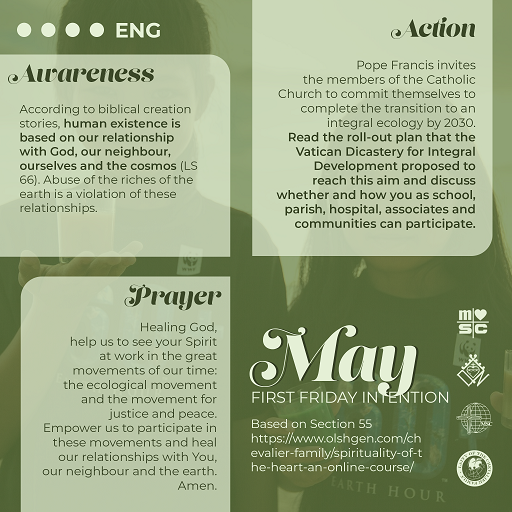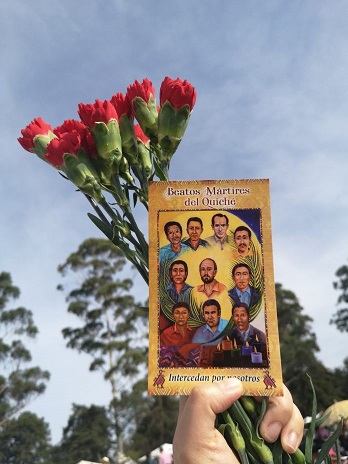First Friday, May 2021, Chevalier Family intention – and a challenging critique from Quiche
The Justice and Peace poster highlights awareness, action (with Pope Francis urging on the Curia) and prayer. The following challenge comes from a critique of the Beatification ceremony on April 23rd – but an affirmation of the words of Abzalon.

When the salt has become insipid, chronicle of a timid and depoliticized beatification
-
May 1, 2021
By Andrés Quezada
How to understand the scant attention that the beatification of ten Catholic martyrs received? Do you remember the excitement that was experienced for the beatification of Brother Pedro? Because the difference? It would be easy to attribute this to the pandemic or to the fact that the Pope came that time. But beyond these contextualities there is an unnamed truth: the complicit silence of those who reserve the devotion of José María, Faustino, Juan Alonso, Rosalío, Miguel, Reyes, Tomás, Nicolás, Domingo and Juanito because perhaps "they were involved in something" .
Who killed them and why? How did they preach the gospel to become dangerous to power? The answer to these questions was absent or timidly elaborated before and during the beatification. This is a critique that sees beyond the beauty of the ritual, the strength of the songs or the joy of being in a wide field celebrating communion with the dead that official history continues to silence.
The night before the event, a musical was presented to narrate the history of the church in Quiché from before the conquest until the day of judgment - where a white god in a white sky meets the blessed in white robes. From the staging, I was struck by the representation of the role of the Church in the invasion; nuns and priests separated the conquerors from the Mayan warriors in a conciliatory attitude that does not fit in with a past in which Sepúlvedas abound and Bartolomés de las Casas is scarce. Then these same actors stripped their ritual objects from the Mayans and forced them close to the cross so that they knelt before the "victorious Christ" exalted in the songs. This interpretation takes us away from the example of one who, far from being well with everyone, sided with the poor, women and nobodies.
On the other hand, if the context and the pastoral and political action for which the martyrs were killed are ignored, what remains is to remember them as sheep caught in the crossfire of the demons of war. Uprising and oppressive peoples are thus tied as equally reprehensible extremes. Although this reading pretends to be a third way of peace, it implies accepting the domination of the strong and the silence of the defeated. It is not worth condemning both “extremes” but to consent to the censures imposed by one and reduce the history of the other to an irrational battle against colonialism or social inequality.
If the martyrs gave their lives, it was for their struggle to continue, not for their death to be fetishized by subtracting the uncomfortable elements that explain it and without assuming the difficult challenge that the past makes us. Walter Benjamin well says that "not even the dead will be safe from the enemy if he wins." What is the use of commemorating if there is no willingness to continue doing what they were murdered for?
To empty the context of his death of political content is to relive his martyrdom and legitimize the path that the church is for rituals and not for the search for justice. What made the Quiché martyrs a threat was that they assumed the kingdom of heaven not as a posthumous and metaphysical promise but as a horizon of practicality and political commitment. If, being able to remain silent and pray, they chose to speak and organize, why does he remain silent when it is celebrated in his name?
What should we do with salt that has become tasteless? Ramazzini's homily was tepid and diplomatic. It was until the end of the mass - since we had been sent to go in peace - that a priest, Absalón Alvarado, from the Mission of the Sacred Heart (the same one to which the three priests of the ten beatified belonged) transgressed the border and denounced genocide, political violence, current impunity and corruption shielded by broad pacts of silence and inertia.

The invitation is to revive a belief that was earlier Christian than Roman, which abandons the criminalizing silence and celebrates the voice of those who do not fear the calumny of the powerful. Historical memory should not be innocuous nostalgia but brave reinvention of the struggles that we owe ourselves. This is a responsibility to pay off those of us who remember the story of a man who dared to question power and was crucified for the honesty and forcefulness of his word.
Woe to you who build mausoleums for the prophets who have been murdered by your own parents! Thus they become witnesses and accomplices of what their parents did; because they killed them and you build the mausoleums. "